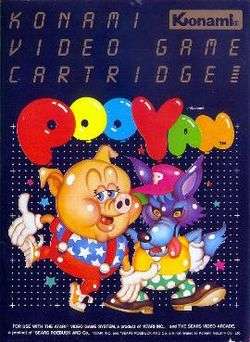Pooyan
 | |
| Developer(s) | Konami |
|---|---|
| Publisher(s) |
Konami (JPN/EU) Stern (NA) Datasoft (Atari 8-bit, C64) |
| Designer(s) | Tokuro Fujiwara |
| Platform(s) |
Arcade (original) Atari 2600, Atari 8-bit, Color Computer 2. Commodore 64, Sord M5, MSX, Apple II, Famicom, TRS-80, Tomy Tutor |
| Release | 1982 |
| Genre(s) | Fixed shooter |
| Mode(s) | Up to 2 players, playing alternately |
| Cabinet | Upright |
| CPU | 2 × Z80 @ 3.072 MHz |
| Sound |
Z80 @ 1.79 MHz 2 × AY-3-8910 |
| Display | Vertical orientation, raster graphics |
Pooyan (プーヤン) is a fixed shooter arcade game released by Konami in Japan in 1982. It was manufactured in North America by Stern Electronics. The player controls "Mama", a pig whose babies have been kidnapped by a group of wolves.
Gameplay
Mama Pig defends her home and rescues her "Pooyan" (the kidnapped piglets) riding an elevator car moved by two "Buuyan" (controlled by the player with a Y-axis [up and down] joystick), and uses a bow and arrow with slabs of meat against the balloon-riding wolves and their boss (the latter being pink in color while the former are red).
There are two stages. In the first, the wolves are riding to the bottom of the screen, and if Mama does not shoot them down, they will climb up the ladders and try to eat her. In the second (occurring after an "intermission" sequence), the wolves are riding to the top of screen, and if enough wolves get there, they will push a boulder on top of Mama, resulting in a life being lost. In both cases, the stage is cleared by shooting all the wolves, though in the second stage the boss must be shot down (which will take many shots unless the meat is used), otherwise the wolves will keep coming.
After the second stage is cleared a bonus round begins. In one type, Mama must shoot all the wolves only using meat, while in the other she must use regular arrows on the fruits. Afterward, the game begins anew with higher difficulty.
When the game starts, "The Other Day I Met a Bear" can be heard during the opening scene (in which the wolves kidnap Mama's babies). The first stage theme bears a very slight resemblance to the main theme music from Frogger, another Konami arcade game. The song is a part of the Desecration Rag (An operatic Nightmare) by Felix Arndt, the portion that mimics the beginning of Antonín Dvořák's Humoresque Opus 101 Number 7. After the second stage is cleared a second time, a part of "Oh! Susanna" can be heard.
Ports
Pooyan was ported to the Atari 2600, Atari 8-bit family, Color Computer 2, Commodore 64, Sord M5, MSX, Apple II, Tandy TRS-80, Tomy Tutor and the Famicom. The Famicom port was also released for the Virtual Console only in Japan.[1][2]
Legacy
Pooyan is included on a compilation disc, Konami Arcade Classics, for the PlayStation. An emulated version of the game was released in 2006 for PlayStation 2 in Japan as part of the Oretachi Geasen Zoku Sono-series.
There is a series of extra ops in Metal Gear Solid: Peace Walker known as the "Pooyan Missions", which involves shooting Fulton surface-to-air recovery balloons carrying abducted soldiers off into the air. Sound effects and music from the arcade game are used throughout the mission.
Clones
- A largely identical bootleg was sold under the name Pootan.[3]
- Homebrew clones for the ColecoVision and VIC-20 were released in 2009 and 2013 respectively.
Other Media
- Pooyan, was one of the videogames based for Manga titled Famicom Rocky published by Coro Coro Comics from 1985 to 1987.
- Mama Pig from Pooyan was made cameo appearance-along in the panel manga Konami 4Koma Manga Wai Wai World, part of the Famicom Runners High.
Highest score
David Hanzman of Rochester, NY, USA, scored a world record 1,609,250 points on the arcade version of Pooyan on December 16, 1983.[4]
References
- ↑ https://www.nintendo.co.jp/wii/vc/vc_py/index.html
- ↑ https://www.nintendo.co.jp/titles/20010000009706
- ↑ The International Arcade Museum, Pootan
- ↑ "Twin Galaxies' Pooyan High Score Rankings". Archived from the original on 28 February 2009. Retrieved 27 December 2009. Archived copy at WebCite (July 14, 2007).
External links
- Pooyan at the Killer List of Videogames
- Pooyan at the Arcade History database
- The Atari 2600 version of Pooyan can be played for free in the browser at the Internet Archive